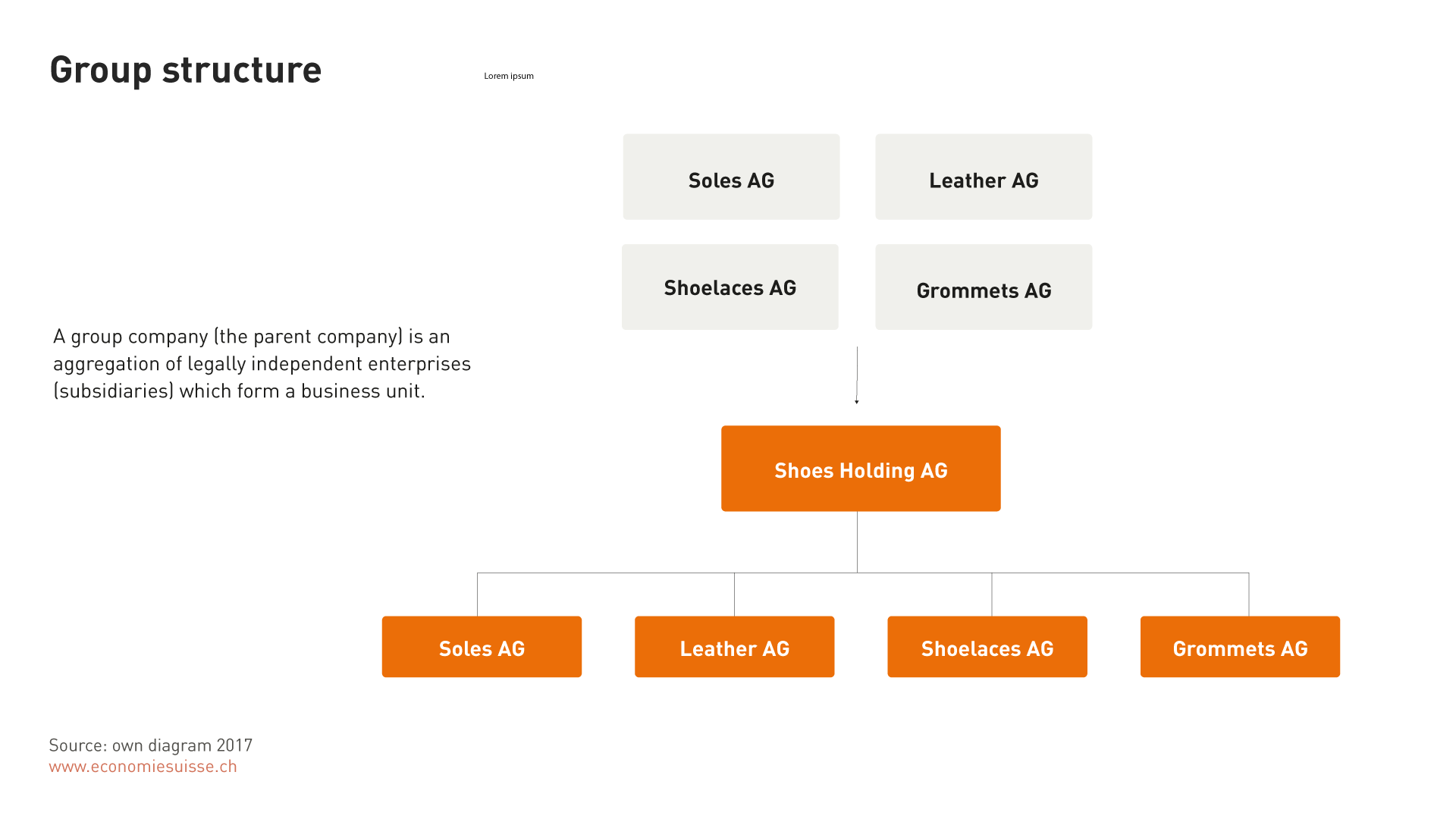Solutions rather than Litigation
- Introduction Executive summary | Positions of economiesuisse
- Chapter 1 Costly and Harmful Bogus Claims
- Chapter 2 SMEs are also affected
- Chapter 3 Principles of liability
- Chapter 4 Corporate responsibility in Switzerland for large companies
- Chapter 5 Weak points of the Initiative
- Chapter 6 Deeper legal analysis
- Chapter 7 The standpoint of economiesuisse
Corporate responsibility in Switzerland for large companies
Definition of a large group company
From a legal standpoint, a group company is an aggregation of enterprises that form a business unit, where the entities retain their legal independence.
The Swiss Code of Obligations (SCO) describes the group company (indirectly) as a company that controls another undertaking. In colloquial terms, one refers to a group as a parent company.
Figure 3
A group (parent company) is a company made up of independent entities (subsidiaries).

Well-developed solutions for liability in group structures
A group itself, i.e. the totality of its undertakings, cannot be liable. Only the individual enterprises in the group and their administrative bodies (e.g. the board of directors) can assume liability. The parent company, as shareholder of its subsidiaries, in principle is not liable for their obligations. In certain circumstances, however, the parent company may have to accept liability for the obligations of its subsidiary or subsidiaries in Switzerland.
Liability based on a de facto role as administrative body: If the parent company performs tasks that lie within the responsibility of the management organs of the subsidiaries, it may be deemed to be a de facto administrative body and might thus have to accept liability.
Liability arising from "piercing the corporate veil": If the principles of corporate law are violated, the legal separation between individual independent companies within the group may exceptionally be pierced. This "piercing" occurs when the appeal to the presumed legal independence of the subsidiary seems abusive (known as "piercing the corporate veil").
Liability resulting from trust in the group company: The parent company may have to accept liability if it gave rise to certain expectations concerning the responsibility of the group that it did not live up to.
Applicable due diligence provisions on human rights and the environment
Already today, the management bodies of Swiss companies are obliged to observe the provisions regulating human rights and the environment. Therefore, the parent company's duty of care also extends to the business transactions carried out by the subsidiary. If a Swiss parent company has de facto control over the business transactions of its subsidiary, it can already be sued and sentenced to pay damages in Switzerland.
The obligations of the topmost corporate management already apply to the whole group.
- The obligation to observe the strict standard of care prescribed by the Federal Court.
- The duty to intervene in the event of human rights violations in specific cases, and take countermeasures without delay.
- The obligation to identify the risk of infringements against the law and to set up a group-wide Internal Control System (ICS).
- The obligation to monitor the concrete management of business transactions throughout the group. The companies are required to ensure Corporate Governance in general, and specifically compliance with the new Section 20 of the "Swiss Code" 2014.
A report recently commissioned by the Federal Council shows that no legal system comparable to that of Switzerland (particularly among the OECD countries) provides for a more thorough duty of care of the board of directors than that anchored in existing Swiss law. Yet the Initiative aims to go much further.
There are established procedures in case of abuse
The National Contact Point (NCP) is a platform that promotes the application of OECD guiding principles for multinational companies. An important function of the NCP is conciliating problems that arise between affected parties. In such cases, the NCP invites the parties to a round-table meeting, and also offers mediation services. This NCP procedure has many advantages compared to the use of purely legal instruments. For example, the parties involved can apply it without any financial risk or the need for extensive specialist knowledge. The procedure helps to avoid conflicts over jurisdiction. In Switzerland, the NCP has been placed within the SECO.
Additional information: https://www.seco.admin.ch/nkp





